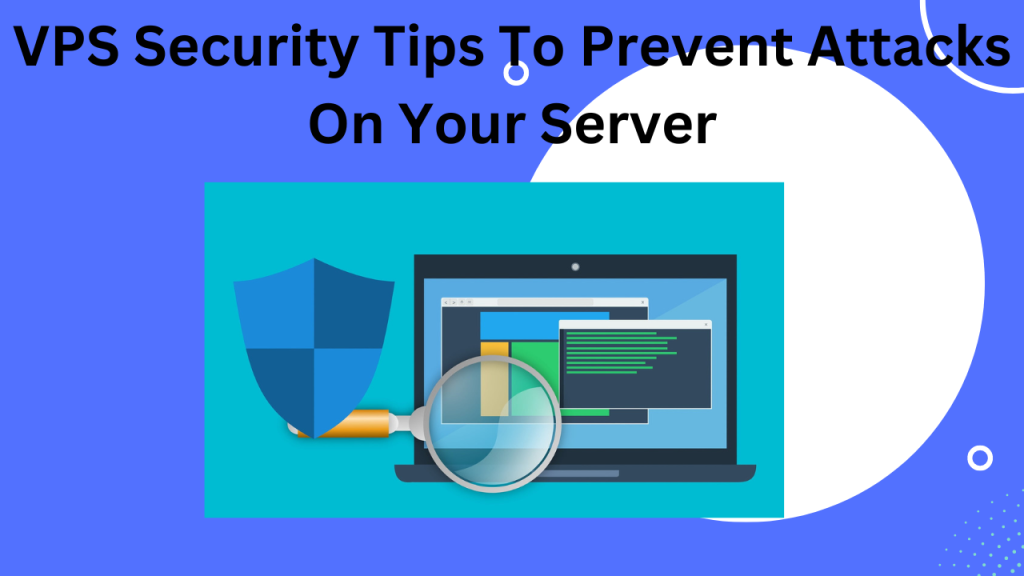In today’s digital world, security is more important than ever. Many people and businesses rely on Virtual Private Servers (VPS) to host websites and apps and store data. But with that comes the risk of cyber attacks. Hackers often look for weak spots to steal data or take control of servers. To stay safe, following essential VPS security tips to secure your VPS is important.
Luckily, there are simple steps you can take to protect your VPS. You don’t have to be a tech expert. This guide shares easy-to-follow tips that can help keep your server safe from threats. These VPS security tips will help reduce risks and protect your valuable information.

VPS Security Tips: Essential Practices to Prevent Attacks on Your Server
1. VPS Security Tips: Use Strong Passwords to Protect Your Server
Using strong passwords is one of the most straightforward and essential VPS security tips to protect your server. A weak password is like leaving the front door open, making it easy for hackers to exploit. Hackers often use tools to guess simple passwords very quickly, a method known as a brute-force attack.
A strong password should be long and use a mix of characters, which is a key VPS security best practice. Include:
- Uppercase letters (A–Z)
- Lowercase letters (a–z)
- Numbers (0–9)
- Special characters (!, @, #, $, etc.)
Avoid using personal details like names, birthdays, or common words. These are easy to guess and can compromise your VPS security. Also, never use the same password on different accounts.
Another VPS security tip that can help is using a password manager. It creates and stores strong passwords for you, so your VPS remains secure even if you forget the password.
2. VPS Security Tips: Disable Root Login for Better Protection
In Linux VPS systems, the root user has complete control. This account can do anything, including changing files and installing software. That power makes it a common target for hackers.
Hackers who access the root account can completely remove your server. To prevent this, disable root login. Instead, you can create a new user with limited access and permit it to use admin tools when needed.
By disabling root logins, attackers are prevented from immediately gaining full access. This small change makes a big difference in your VPS security.
3. VPS Security Tips: Use SSH Keys Instead of Passwords for Secure Access
Many VPS users connect to their servers using SSH (Secure Shell). Usually, a password is entered to log in. But passwords can be stolen or guessed.
SSH keys provide a better way. They are more secure than passwords and harder for hackers to crack. SSH keys come in two parts:
- Private Key – This stays on your computer
- Public Key – This is placed on your VPS
When you log in, both keys must match. If they don’t, access is denied. Since the private key never leaves your device, it’s tough to steal.
Setting up SSH keys is easy. Many hosting providers offer guides to help with this. Once done, your VPS will be much safer.
4. VPS Security Tips: Keep Your System Updated to Prevent Vulnerabilities
Many people often forget to update their systems; however, updates typically include important security fixes. If your VPS uses outdated software, it could have vulnerabilities that hackers can exploit. Therefore, to follow essential VPS security tips, ensure your operating system, control panels, and installed apps are always up to date. You can either set automatic updates or check for updates regularly.
Additionally, old software is frequently targeted by cybercriminals because known issues remain unresolved. By keeping everything current, you can significantly reduce these risks, which is one of the most effective VPS security best practices.
5. VPS Security Tips: Use a Firewall to Safeguard Your Server
A firewall acts like a guard at the gate. It decides what traffic can enter or leave your server. By setting up a firewall, you can block unwanted visitors.
Most VPS providers let you add a firewall to your server. You can choose which ports and IPs to allow. For example, you can only connect your IP address through SSH.
There are easy-to-use tools like UFW (Uncomplicated Firewall) and CSF (ConfigServer Security & Firewall). Firewalls help prevent many types of attacks.
6. VPS Security Tips: Change the Default SSH Port to Reduce Attack Risks
By default, SSH uses port 22. Hackers know this, so they often scan for servers on this port. Changing the port number makes it harder for them to find you.
Pick a number between 1024 and 65535 that other apps don’t use. Update your SSH settings and restart the service. Then, make sure you connect using the new port.
This trick doesn’t make your server bulletproof but helps lower the risk of random attacks.
7. Limit Login Attempts to Prevent Brute-Force Attacks
If someone tries to log in many times in a row, it may be a brute-force attack. To stop this, you can limit login attempts.
Tools like Fail2Ban can help. They watch for failed logins. If a user fails too often, their IP is blocked for a while. This stops attackers from guessing your password again and again.
These tools block automatic attacks when you use them.
8. Schedule Regular Backups to Protect Your Data
Even with all these tips, something could still go wrong. That’s why backups are essential. A backup can save the day if someone hacks or crashes your server.
Store backups in a different location. This way, they stay safe even if someone compromises your VPS.
You can use automated tools to schedule regular backups. Some hosting providers also offer this service.
9. Monitor Server Activity for Suspicious Behavior
Monitoring is essential because it helps you spot unusual activity on your server. For instance, you’ll be alerted if someone tries to access your system without permission. You can use tools that log server activity to stay informed—tracking logins, file changes, and running applications. Whenever something looks suspicious, it’s essential to investigate immediately. Moreover, some tools send alerts when they detect strange activity, allowing for a quick response, which is crucial to preventing severe damage.
10. Use Antivirus and Anti-Malware Tools for Extra Protection
Although many think Linux servers don’t get viruses, the risk still exists—even if it’s less common. Therefore, it’s smart to use antivirus tools as a precaution. For example, apps like ClamAV can scan for harmful files, while anti-malware tools help block suspicious activity. Together, these tools add another layer of defense to your VPS. Additionally, keep them updated so they can protect against the latest threats.
Conclusion: Implement These VPS Security Tips to Safeguard Your Server
A VPS gives you power and control. But it also means you are in charge of security. With a few simple steps, your server can be protected from most threats.
Let’s quickly recap the tips:
- Use strong passwords
- Disable root login
- Switch to SSH keys
- Keep software updated
- Set up a firewall
- Change the SSH port
- Limit login attempts
- Create regular backups
- Monitor server activity
- Use antivirus tools
These VPS security tips are easy to follow. Some actions are done once, and others require regular checks, but each step makes your server safer.
Security should never be ignored. With these steps, your VPS will be well-protected against attacks.














One Comment